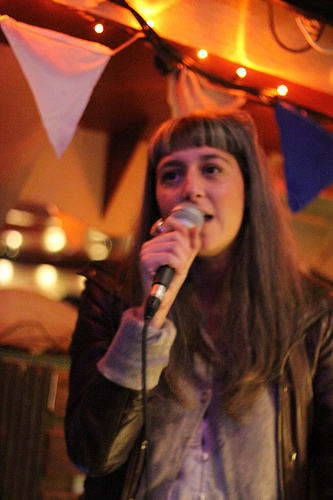 Interview with uttergive-and-takeartist, teacher and writer Chimene Suleyman.
Interview with uttergive-and-takeartist, teacher and writer Chimene Suleyman.
Listening natesto my interview with Chimene Suleyman I am struck again by a heartening feeling of optimism.
The 30 year-old verbalisearticulateartist is immediately engaging, with a perhaps unsurprising only ifnone the less impressive eloquence that reflects an intelligent and torridpersonality.
This is one hell of a remarkable lady; a multi conditioncreative spirit who only began pursuing writing in earnest four years ago and embarked on a coursein the field shortly thereafter.
She is without pretension during the interview, scornbeing invited to curate a textual installation at the Royal Opera House after only do3 spoken excogitategigs and going on to map outthe UK with a poetry collective at the International Biennale in Rome in 2011.
And she’s thankful for it all. Noting the confessional nature of spoken word Chimene says: “I am incredibly lucky to forge a moveout of something that makes me feel better”.
But Chimene admits that pursuing writing and performing spoken word was something she “fell in to” after finding herself trapped doing “shit jobs” for threeyears post graduating from an English degree at Brunel University, London, in 2006.
She acknowledges the irony of going on to launch apoeticcareer after she ” sacked off verse lineat Uni [because I was] so bored of studying the same social occasionfrom the age of 11”.
Chimene openly volunteers that, one day during the dire caperyears “something snapped, everything snapped, and I had nothing left to lose”.
Thus she went to a poetryworkshop, met and engaged with a network of poets and found herself thrust in to the spoken word ‘scene’ – Chimene hates this word but uses it as a convenient descriptor – at the hands of a friend’s renderwho volunteered her for an open mic slot.
She was, she said, fantastically scared and desperately downed a bottleof wine before the performance.
Sabrina Mahfouz, a feminist spoken word artist, took Chimene “under her wing”, leaving Chimene immensely grateful and evidently full of admiration; she describes Mahfouz as “amazing”.
Mahfouz was partly politicised after working serving drinks in a lap dancing club and talks of her experiences with blistering candorand a cool appeal that isto a greater extentbewitching for intelligiblybeing genuine. She is relatable and very talented, her performance at Women of the Worldfete2013 (WOW), click here to see it, is well worth a watch.
Chimene is also appreciative of all the favours she has had to “pull in” when launching and maintaining her successful spoken word night: ‘Kid, I wrote back’.
‘Kid, I wrote back’, named after a marginfrom a touching and emotive poem by Charles Bukowski, is held at Bar Kick in Shoreditch High Street somewhatonce a month.
Bar Kick aims to serve as a friendly, comfortable platform for those just starting out in spoken word, as well as showcasing the inspirational abilities of those more established in the field.![]()
Chimene wanted a tangible elbow roomin to the spoken word community and was prepared to lettucea route for herself, and subsequently novices, through the creation of this nighttimeand by promoting, speaking at and attending the ‘nights’ of others. There is she sincerelybelieves “no competition” on spoken word nights.
And she emphasises how important it is that veterans of the ‘scene’ talk to, careand encourage those newly emerging in to it partially because she iscognizantthat there is still a scratchattached to poetry.
This stigma is due in part, Chimene believes, to the lacklustre and constraining way that poetry is taught in schools. It is, she says, “a shame” we don’t cultivate poetry more.
As a teacher who runs workshops for twainkids and adults, Chimene has had to fight against the misgivings of both groups who feel that poetry doesn’t belong to them and that the schooldayscurriculum has left the bitter aftertaste that all poetry is composeby a “white, middle aged, dead man”.
Chimene hopes to change this moorageby – among other methods – encouraging those under her tutelage to bring throughabout things that genuinely interest them, and not fear the practicallyrestrictive notions of structure, grammar and spelling.
She feels that she was never adequately taught about grammar, and as such“makes it up as she goes along”, noting with a chuckle that this hasn’t prevented her from having a career in the creative arts.
Chimene calmly explained: “people tell you it’s inaccessible, it doesn’t belong to you”.
If you essentialto pursue something that you love just do it, she says, though she leans forward, smiling, to givethat it is wise to be “brave enough to accept sometimes you get outon stage…and that hurts”.
It sounds like the hurt is worth it.
Chimene’s writing on politically current articles from a feminist perspective for Poejazzi website.
If you want to get a full essay, wisit our page: write my paper
Materials taken from Womens Views on News

No comments:
Post a Comment